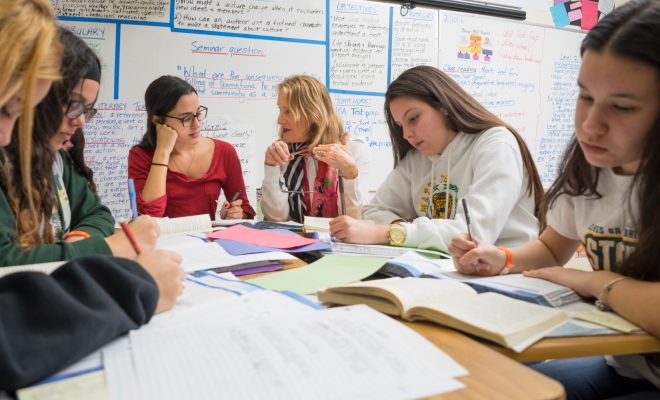2023 Best Online Master’s in Science Education Programs

Click here to find out more about the ranking methodology that we used to compile this list.
Congratulations! If you represent a college or university that is included in this list, please collect your seal below.
Deciding which college to attend can be a daunting task. For many, it will be the most important decision that they make in their lives. To make an informed decision, you have to consider a lot of variables, such as cost of attendance, financial aid, student/teacher ratio, academics, student life, and more. These factors will either positively or negatively impact the quality of education that you receive.
Do you want to acquire an online master’s degree in science education, but don’t know what institution you should attend? Well, if you are as ambitious as I was in my late teens, then you want to attend a top school, instead of an average or mediocre one. Fortunately, we have already done the legwork for you. To help you find the right school for your interests and goals, we’ve compiled a list of 2022’s best online master’s in science education programs.
What institution did we forget? Leave your thoughts in the comment section below.
- North Carolina State University, Raleigh, NC
Learners in NC State’s master of arts in teaching science–secondary education (MAT) receive a teaching license and finish a master’s degree in an accelerated format. This MAT degree program centers on 9–12 grade science education. NCSU’s online master’s in science education employs a blended model that contains on-campus and online classes. The 33-credit MAT degree program requires learners to sustain a 3.0 GPA; class concepts consist of technology tools for science teaching and examining diversity in the classroom and community. All learners partake of a semester-long teaching experience in which they apply their learning to real-world teaching scenarios.
Candidates must submit proof of a 3.0 cumulative undergraduate GPA and a bachelor’s degree in a scientific field from an institution recognized by a regional accreditation agency, such as the Southern Association of Colleges and Schools. Prospective learners also should have a combined score of 300 on the verbal and quantitative sections of the GRE (taken within the last five years). The state of North Carolina requires science teachers to receive a holistic license.
- East Carolina University, Greenville, NC
East Carolina University has an entirely online master of arts in education–science education. The MA readies graduates to teach in a two-year college setting or to boost their professional advancement. The 36-credit program comprises at least 18 credits in physical, biological, or earth science; perspectives on science education; contemporary approaches to teaching biological science; and advanced methods in science teaching and learning. Learners finish another 12 credits in science education, with the remaining six credits taken via electives. Learners also must finish a thesis, pass a holistic science education examination, and attain a 3.0 cumulative GPA across their classwork. Due to state education regulations, ECU does not offer this degree to learners residing in Alabama, Massachusetts, Minnesota, Maryland, and Ohio.
Candidates must have graduated with a science-based bachelor’s degree program and deliver proof of a cumulative 2.7 GPA from their bachelor’s degree or a 3.0 GPA during their senior year and significant classes. This degree program application also requires three letters of recommendation and a letter of intent from prospective learners.
- Oregon State University, Corvallis, OR
Oregon State University’s Ecampus has an entirely online master of education—advanced science and mathematics education for people wanting to teach science to K-12 learners or to get further expertise in the field. This online master’s in science education also enables working educators to utilize their workplaces to research a required project within the degree.
OSU’s master’s degree is a two-year degree program, which enables learners to partake in an active learning community. All classes are finished online although some require locally proctored exams and are taught by the same expert faculty as the on-campus classes. The 45-credit degree comprises 18 credits in core classes, 12 credits in focused courses, and the remaining 15 credits in electives.
Candidates should have a 3.0 cumulative GPA in undergraduate classes, a bachelor’s degree in a related field, at least one year of teaching experience, and access to an educational setting in which to carry out classwork research. This degree program accepts a maximum of 15 transfer graduate credits. This degree program does not deliver professional licensure outside the state.
- Nova Southeastern University, Fort Lauderdale, FL
NSU’s Fischler College of Education has a master of science in education with a concentration in science education. This master’s degree program readies graduates for middle and high school level science education and is geared for educators looking to boost expertise in their field. Classes consists of multidisciplinary earth science for teachers, teaching holistic ocean studies, and teaching inquiry-based life science. Learners finish 36 credits to graduate and participate in a culminating professional experience in which they apply learned classwork to a real-life teaching scenario. The Council for the Accrediting Body of Educator Preparation (CAEP) offers accreditation to NSU’s College of Education, and covers the online advanced educator programs, but does not cover re-licensure. Learners residing outside Florida should check with their state department of education to make sure that this degree meets their state’s education prerequisites. Out-of-state learners pay the same tuition as their in-state counterparts. Candidates must have earned a minimum cumulative 2.5 GPA in their bachelor’s degree to apply.
- Hamline University, Saint Paul, MN
Hamline has an online master of arts in education—natural science and environmental education that features a required field research component within the learner’s community. Hamline is the only United Methodist institution in the state of Minnesota.
Learners in this online master’s in science education finish classwork asynchronously, and in as little as 18 to 24 months. This 34-credit master’s degree has 24 credits of required classes in concepts like the environment and society, history of the environment, and ecological systems. The remaining 10 credits are electives and may be earned by completing the school’s Environmental Education certificate, taking continuing education classes within the graduate school, or from classes offered in any other continuing studies certificate degree programs. Learners also finish a capstone project or capstone thesis to graduate.
- University of Nebraska at Kearney, Kearney, NE
The University of Nebraska system has an online master of science in education—science/math education intended for educators looking to get further expertise in their field as 7th through 12th grade educators. Learners finish 36 credits to graduate, including 12 credits in a specific focus like chemistry, physical science/physics, biology, or math. Other classwork contains natural science coursework and coursework development in multicultural education, each intended to build a solid foundation for science/math education. Learners in this master’s in science education online degree program also must pass a holistic final exam within their field of study, and a three-credit capstone class allows learners to design a new curricular unit or redesign an existing one to be utilized in the classroom.
The remaining coursework consists of nine credits of general teaching classes, six credits of math or science outside the learner’s area of focus, and six credits of electives. Online learners utilize Microsoft Imagine and SmarterMeasure, which helps learners comprehend their strengths and weaknesses in distance learning.
Out-of-state candidates should determine whether this degree program fulfills their state’s educational prerequisites as an advanced degree in science/math education.
- Northern Arizona University, Flagstaff, AZ
NAU has a master of arts in science teaching (MAST) completely online. The degree program is intended for secondary educators to improve their knowledge in the field or advance their current careers, especially those who concentrate in chemistry or biology. Graduates find jobs in an array of educational settings, including middle schools and high schools, private and public, as science education leaders; they are also ready for advanced study for a PhD or EdD. CAEP accredits this degree program, ensuring quality in educator preparation.
This online master’s in science education requires learners to finish 30 credits with a cumulative GPA of 3.0 or higher. The coursework comprises 15 credits of science content classes, 12 credits of science education classes, and a three-credit thesis or non-thesis capstone project. NAU has this online MAST degree only in a synchronous format; learners attend classes via video conferencing. For part-time learners, the degree can take an average of two years to finish, with six credits taken every semester, and three to six credits taken during the summer.
Candidates must show a minimum cumulative GPA of 3.0 from their undergraduate studies to be admitted.
- Columbus State University, Columbus, GA
CSU’s College of Education and Health Professions has an online master of arts secondary education in science for educators looking to boost their careers. This 39-credit master’s degree contains classwork in classroom management, knowledge of learners, and methods in teaching secondary science. Learners also finish in-classroom teaching with either a teaching internship or student teaching class. Learners must sustain a cumulative GPA of 3.0 across the degree program and cannot graduate with two or more classes with a C or lower grade.
Candidates must have achieved a minimum 2.5 cumulative GPA on all previous undergraduate and graduate classwork, a passing score on the Georgia Assessments for the Certifications of Educators or the GRE, ACT, or SAT and hold a bachelor’s degree in a related field or have 26–44 hours of relevant classwork from a regionally sanctioned school. CSU accepts a maximum of nine transfer credits with a C grade or higher. This degree program only accepts incoming learners in the fall semester. Out-of-state candidates must verify that this online education degree matches their state’s educational regulations by emailing the degree program beforehand.
- Western Michigan University, Kalamazoo, MI
WMU has been a leading research institution for over a century; the university features three campuses across Kalamazoo, along with regional locations across Michigan and Florida. WMU’s Mallinson Institute for Science Education offers a fully online master of arts in science education that readies graduates to teach science in a primary or secondary school setting, or for advancement to a doctoral degree program in science education. This 30-credit online MS in education comprises science education core classes, science content classes, and higher-level science education classes. The final six credits are earned via elective classes, a thesis, or an independent project.
Diverse class offerings consist of cognition and teaching, evolution for teachers, and intro to astronomy. WMU also offers online learners the chance to take the history/philosophy of science, the history/philosophy of science education, and models of teaching and learning classes on-campus if they live locally.
Online learners benefit from assistance, including the capacity to set up Skype appointments with the Writing Center. Out-of-state learners pay the same tuition as in-state learners. Learners may utilize a maximum of six transfer credits from another graduate science teaching degree.
- Montana State University – Bozeman, Bozeman, MT
MSU is Montana’s largest university and has a national reputation for delivering excellent educational programs. MSU has an online master of science in science education for educators looking to advance in their careers. This 30-credit master’s in science education requires 12 credits of multidisciplinary science classes in an array of related fields; the remaining credits consist of 14 core education credits and four elective credits from either science or education departments.
Nearly 80 percent of MSU’s classes are delivered online in an asynchronous format, while the remaining classes occur on the Bozeman campus, including field and lab classes offered in the summer. Learners must take a two-credit field/lab on-campus; learners also present their final capstone project on-campus during the Summer Science Education Symposium. Candidates must submit proof of a cumulative undergraduate 3.0 GPA and verify two years of successfully teaching science in an educational setting.






